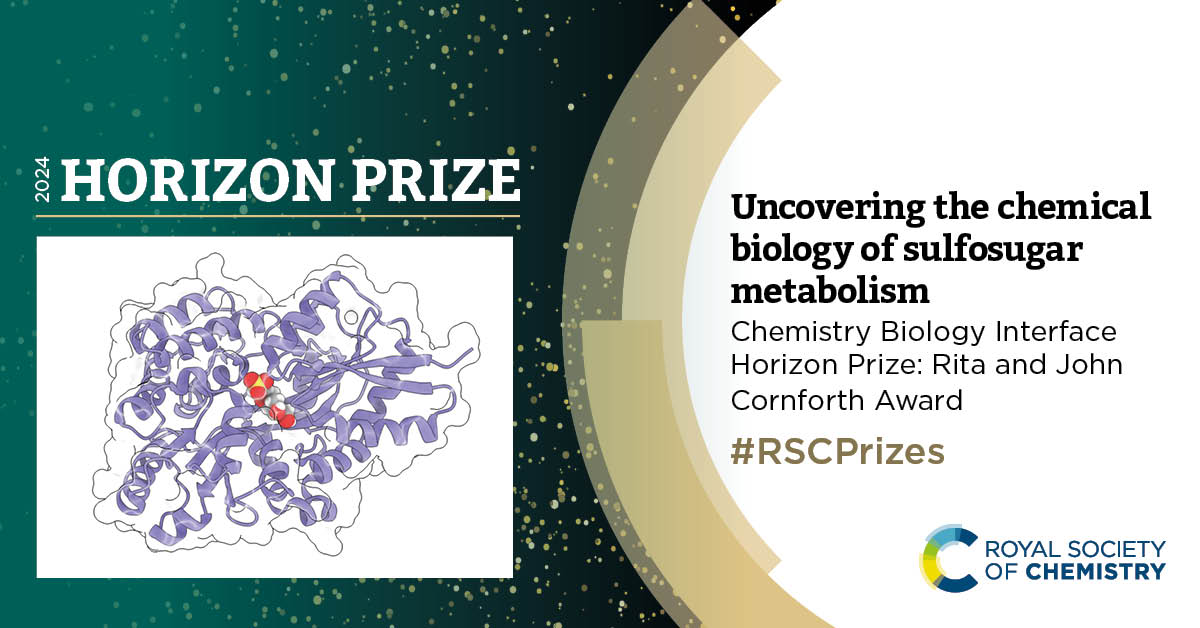Oh-o!Meijiシステム
【農芸化学科】島田友裕准教授が参加している共同研究が英国王立化学会に表彰されました
2024年06月13日
明治大学 農学部事務室

島田友裕准教授は、共同研究において、酵素を利用する仕組み(遺伝子発現)の解析を担当しました。
受賞にあたって、英国王立化学会からは受賞について、以下のとおりリリースされています。
==================================================
Biosulfur Recyclers win prestigious Royal Society of Chemistry Prize
Biosulfur Recyclers have been named winners of the Royal Society of Chemistry’s Horizon Prize, which celebrates discoveries and innovations that push the boundaries of science.
Biosulfur Recyclers is a multinational, multidisciplinary collaboration with team members from Australia, the UK and Japan.
The prize was awarded for developing an understanding of sulfosugar metabolism and the discovery of new enzymes and pathways of sulfur recycling. The team receive a trophy and a video showcasing their work, and each team member receives a certificate.
The team's goal is to understand how tiny organisms break down sulfur-containing sugars called sulfosugars. In doing so, they are shedding light on a crucial but poorly understood ‘recycling’ process in nature.
Sulfur is a critical element for life on Earth and is one of the four macronutrients, along with nitrogen, phosphorus, and potassium. It is found in proteins and special sugars that help plants capture sunlight (photosynthetic organisms). Because sulfosugars are produced by almost all photosynthetic organisms, they are extraordinarily abundant, with an estimated 10 billion tonnes generated and broken down each year. But, despite their prevalence, how they get broken down by nature has remained a mystery.
The team’s work has made three significant contributions to uncovering this mystery. 1) They studied the breakdown pathway of a sulfosugar called sulfoquinovose. This pathway is similar to how regular sugar (glucose) breaks down (glycolysis) and has therefore been named sulfoglycolysis. 2) The team discovered a new pathway for the breakdown of sulfoquinovose that, unlike the sulfoglycolysis pathway, directly targets the unique carbon-sulfur bond in sulfoquinovose. 3) They discovered a new family of enzymes that release sulfoquinovose from sulfolipids (the form they exist in within plants). This step is crucial before the breakdown process can begin. While this reaction normally involves water (hydrolysis), the team discovered a class of enzymes that use a hidden chemical reaction to achieve the same result.
Team representative Spencer Williams said: "I am ecstatic that our team’s work is being recognised by this prestigious award. I am extremely proud of everyone in the team: the work could not have been done without this brilliant group of dedicated scientists with their incredible breadth of skills."
Colleague Arashdeep Kaur added: "I am delighted to see our team's dedication honored with this award. This accomplishment is a testament to the outstanding group of committed scientists I am fortunate to work with. I am immensely proud of our collective accomplishments."
Colleague Nick Scott said: "I was thrilled to learn that our research on bacterial sulfosugars was being recognised with an award from the RSC. This has been a really fun and rewarding collaborative effort over many years, employing cutting-edge approaches to unravel how nature breaks down a vast amount of biomass."
Dr Helen Pain, Chief Executive of the Royal Society of Chemistry, said:
“The chemical sciences cover a rich and diverse collection of disciplines, from fundamental understanding of materials and the living world to applications in medicine, sustainability, technology and more. By working together across borders and disciplines, chemists are finding solutions to some of the world’s most pressing challenges.
“Our prize winners come from a vast array of backgrounds, all contributing in different ways to our knowledge-base and bringing fresh ideas and innovations. We recognise chemical scientists from every career stage and every role type, including those who contribute to the RSC’s work as volunteers. We celebrate winners from both industry and academia, as well as individuals, teams, and the science itself.
“Their passion, dedication and brilliance are an inspiration. I extend my warmest congratulations to them all.”
The Royal Society of Chemistry’s prizes have recognised excellence in the chemical sciences for more than 150 years. This year’s winners join a prestigious list of past winners in the RSC’s prize portfolio, 60 of whom have gone on to win Nobel Prizes for their work, including 2022 Nobel laureate Carolyn Bertozzi and 2019 Nobel laureate John B Goodenough.
The Horizon Prizes highlight exciting, contemporary chemical science at the cutting edge of research and innovation. These prizes are for groups, teams and collaborations of any form or size who are opening up new directions and possibilities in their field through groundbreaking scientific developments. Other prize categories include those for Research & Innovation, those for Education (announced in November), the Inclusion & Diversity Prize, and Volunteer Recognition Prizes.
For more information about the RSC’s prizes portfolio, visit rsc.li/prizes.
NOTES FOR EDITORS:
Rewarding Excellence and Gaining Recognition
The Royal Society of Chemistry’s Prizes portfolio is one of the oldest and most prestigious in the world, recognising achievements by individuals, teams and organisations in advancing the chemical sciences. We reward those undertaking excellent work in the chemical sciences from across the world.
More information is available at: rsc.li/prizes.
About the Royal Society of Chemistry
We are an international organisation connecting chemical scientists with each other, with other scientists, and with society as a whole. Founded in 1841 and based in London, UK, we have an international membership of over 50,000. We use the surplus from our global publishing and knowledge business to give thousands of chemical scientists the support and resources required to make vital advances in chemical knowledge. We develop, recognise and celebrate professional capabilities, and we bring people together to spark new ideas and new partnerships. We support teachers to inspire future generations of scientists, and we speak up to influence the people making decisions that affect us all. We are a catalyst for the chemistry that enriches our world.








